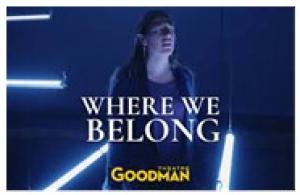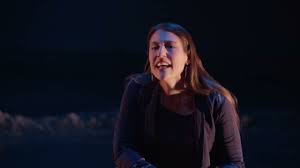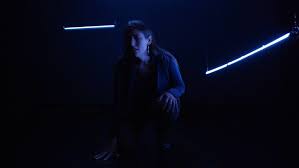
5 Stars! Highly Recommended! Madeline Sayet is vivacious and compelling in “Where We Belong”, a striking 85-minute autobiographical account of her life and her adventures going abroad to the United Kingdom to get a Ph.D. in Shakespeare. Her impactful narrative expresses what it is like to straddle more than one culture and love parts of both—while at the same time, she questions who she is and where she belongs. In so doing, she merges the three aspects of her life that give her the most meaning: Shakespeare’s use of language, her love for her mother’s Mohegan culture, and her desire to tell a good story.
She lights up when she talks about all of these things. Madeline describes herself as follows:
“In the States I direct plays, as a Native person I promote Native stories, in the UK, I study Shakespeare - my area of research is the relationship between the indigenous peoples of America and Shakespeare’s plays.
“Today’s story isn’t about Shakespeare though.
“It’s not a traditional Mohegan story either.
“Today’s story, is how I became a bird.”

Sayet’s narrative in English, punctuated with bits from the Mohegan language, is largely a revelation about her life’s seemingly zigzag pattern. At the same time, her story provides us with an insight into our own ways of thinking about cultural differences within the United States today. Sayet explains what it was like to grow up in a multicultural household where her mother was Mohegan and her father was Jewish. She refers to the time when her parents were already divorced and her father was supposed to take custody of her and her siblings. But in an effort to remain with her mother, she intentionally locked herself in an upper floor bathroom and refused to come out. Her father eventually left with the other children, leaving her mother to raise her. Sayet thinks of herself as “nightmare child” on that fateful day, but perhaps she was stubbornly seeking out her own unique path. Perhaps she was destined to be very different from everybody else in her family from the get-go, as reflected by her Mohegan name Achokayis, meaning blackbird or “the dark one who flies apart.”
Throughout the show, Sayet regrets the loss of Native American cultures and languages in the United States, and yet she is fully aware that all cultures evolve and that she is just as much a part of mainstream American culture as anyone else. In that vein, she has internalized ideas about the importance of having a good education, specifically where earning a Ph.D. can allow her the freedom to pursue her own research agenda and fulfill the promise of molding the next generation of scholars. With her favorite Shakespeare play being “The Tempest”, she is interested in exploring the question of “Who really is Caliban?” From Sayet’s perspective, she sees Caliban as embodying the wisdom of the American continent’s native inhabitants and their civilizations, which, in many ways, were more advanced in terms of human relations than those of their European conquerors. She interprets Caliban as embodying the promise of freedom for all human beings, native and immigrant, to be the people who they are supposed to be. She simultaneously struggles with a checkered world history where present and former colonial powers would discredit and dehumanize native peoples throughout the globe up to and including the present era.
“Where We Belong” is produced by the Wooly Mammoth Theatre Company and directed by Mei Ann Teo, with production design by Hao Bai. Touring lighting by Megan J. Coffel is unusual yet highly functional and allows the audience to imagine scenes from Sayet’s life while providing some variety on stage. Composer and sound designer Erik Schilke has added bits and pieces of sound to amplify what Sayet says; blips in conjunction with the moving and flashing lights are particularly effective. I especially liked Asa Benally’s costume design: Sayet’s outfit is creative, beautiful, and fun.

Sayet performs her storytelling beautifully; yet the show left me with a lot of questions. Whatever happened to her father and her siblings? Does she know where they are? Does she still communicate with them? If so, it would be very interesting to see if her siblings share a similar perspective about the Mohegan culture and whether they identify as being part Mohegan. Or have they put aside their origins in favor of the dominant culture? Moreover, if Sayet had left with her father and siblings instead of remaining with her mother, would she be mourning the loss of the Yiddish language, as she does with the Mohegan? Would she have had any interest in reading authors who once wrote in Yiddish or in getting to know something about the oral tradition of Ashkenazi and Sephardic secular storytellers? Something to think about….
While I watched “Where We Belong”, I decided that Sayet’s story is not just about becoming a bird (as she states at the beginning of the show) but, rather, it’s about a bird who has to teach herself how to fly. Sure enough, in the last line of the story (before the epilogue), her mother is quoted as saying, “We named her blackbird, because we knew she would have to fly. And each time she does, she learns something she brings back to all of us.” In the end, Sayet analogizes her decision to travel abroad with the treks of her Mohegan ancestors Occom, Mahomet, and Uncas when they went overseas to England many years ago to advocate for their people. Back then, England was one of the world’s great colonial powers, and each of these men had to grapple with the layering of diverse ways of understanding what life is all about. While they may have been significant historical figures, they were human as well—and today it is Sayet who has made the trek and has established her own point of view. By means of her travel to a country with a different culture than that of the United States, Sayet makes manifest the conscious and subconscious biases regarding cultural superiority and what it means to make value judgments about indigenous people and minority groups.
Sayet’s splendidly drawn monologue reflects her personal growth but also ours as well. Listening to her journey provides us with a new lens for reexamining our own life experiences. Assuming that we might be familiar with at least one other religious, ethnic, or cultural affiliation independent from mainstream American culture, it becomes a matter of choice as to which values, customs, and traditions we wish to preserve and emphasize in our own lives. So how do we navigate among these choices and among various likely identities? And how might this cause us to follow a life course that sets us apart from other people? Hence the ultimate questions remain: Where do we belong? Who do we identify with, and why?

“Where We Belong” is running through July24, 2022 at The Goodman Theatre, 170 N. Dearborn Street, in Chicago.
Tickets start at $15. Price depends on date, time, and seat location.
Performance schedule:
Wednesdays and Thursdays – 7:30 p.m.
No 7:30 p.m. performance on Thursday, July 21
Fridays – 8:00 p.m.
Saturdays – 2:00 and 8:00 p.m.
No 2:00 p.m. performance on Saturday, July 2.
Sundays – 2:00 p.m.
Extra performances:
Tuesday, July 12 – 7:30 p.m.
Thursday, July 21 – 2:00 p.m.
Accessible and enhanced performances:
Spanish subtitled: Friday, July 15 – 8:00 p.m.
Audio-described: Sunday, July 17 – 2:00 p.m.; touch tour at 12:30 p.m.
Sign-interpreted: Saturday, July 23 – 2:00 p.m.
Open-captioned: Sunday, July 24 – 2:00 p.m.
Program books in Braille and large print formats are available from Guest Services.
Patrons may obtain an assistive listening device at Guest Services free of charge. In addition, neck loops are available that are compatible with t-coil hearing aids. Visit https://www.goodmantheatre.org/access for information on additional services.
For more information about “Where We Belong” and to purchase tickets, go to https://www.goodmantheatre.org/belong?utm_source=wordfly&utm_medium=emai...(press)&utm_content=version_A. or phone the box office at 312-443-3800 between 12 noon and 5:00 p.m.
For general information about the Goodman Theatre and for a listing of their other offerings, visit https://www.goodmantheatre.org/.
Please note: Masks must be worn while inside the theater and children under five are not permitted. For a full list of Health and Safety protocols, visit https://www.goodmantheatre.org/protocols
